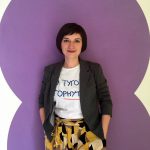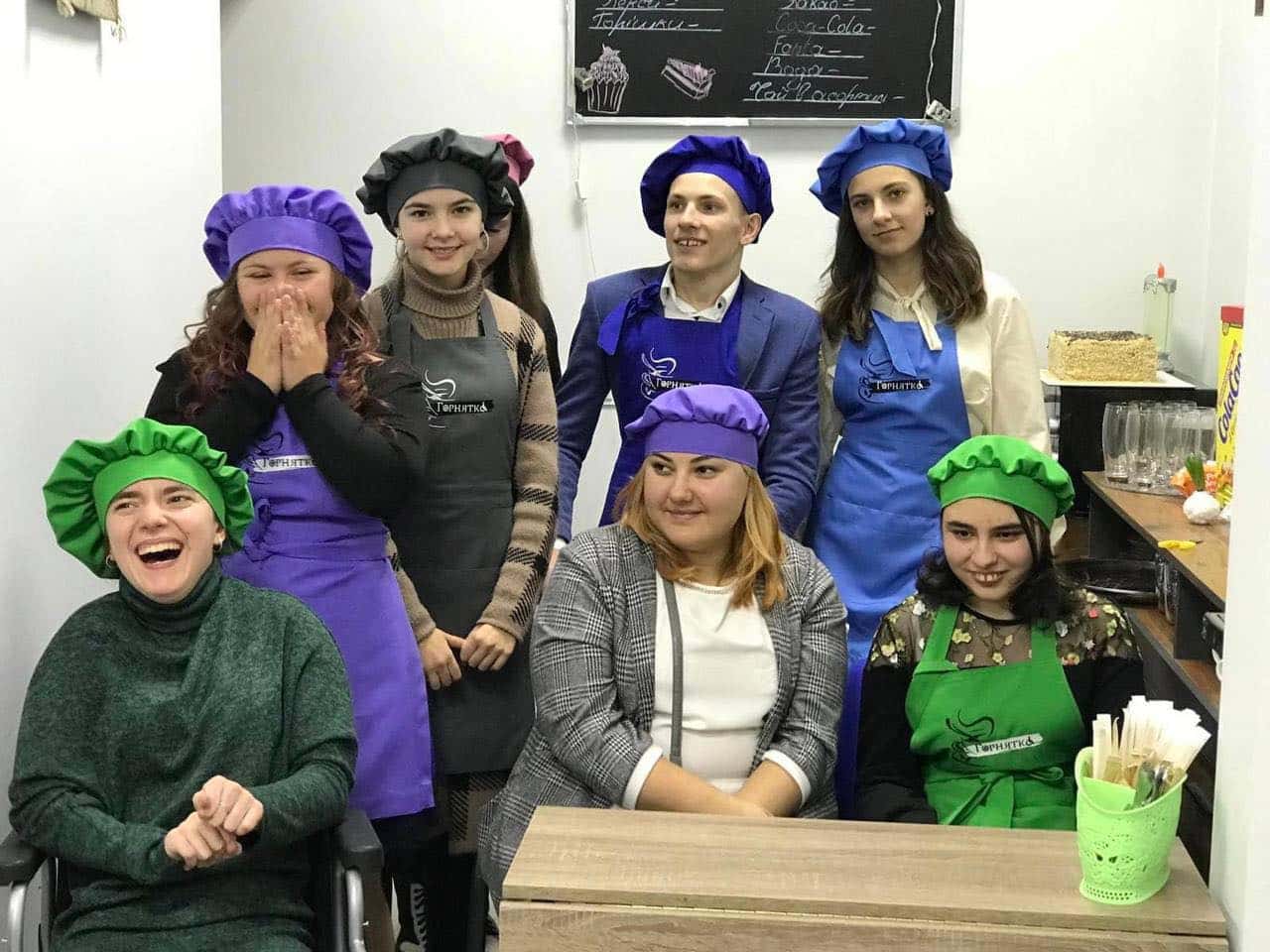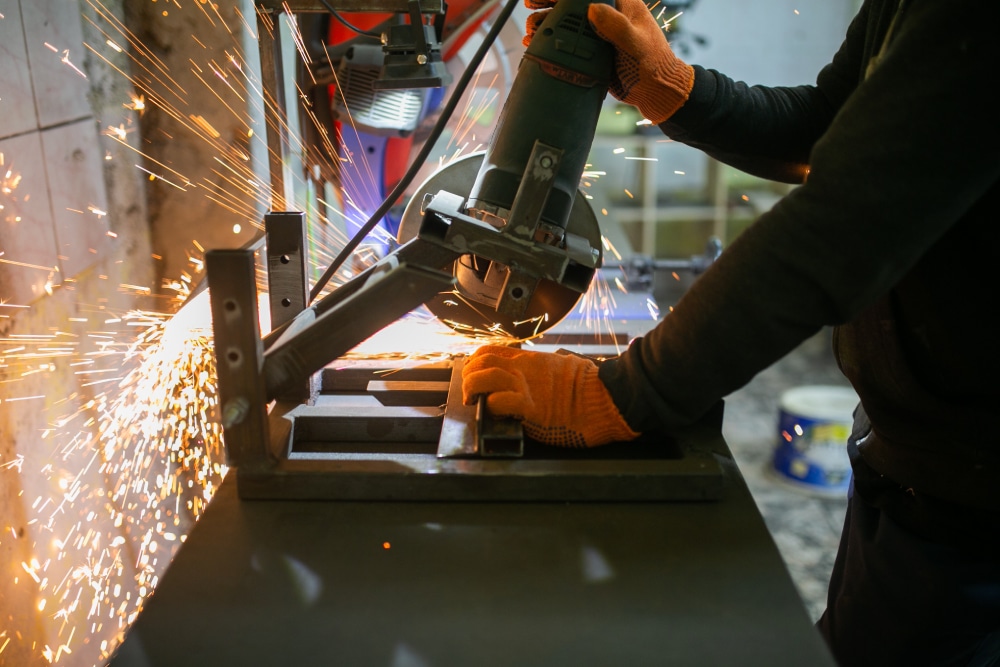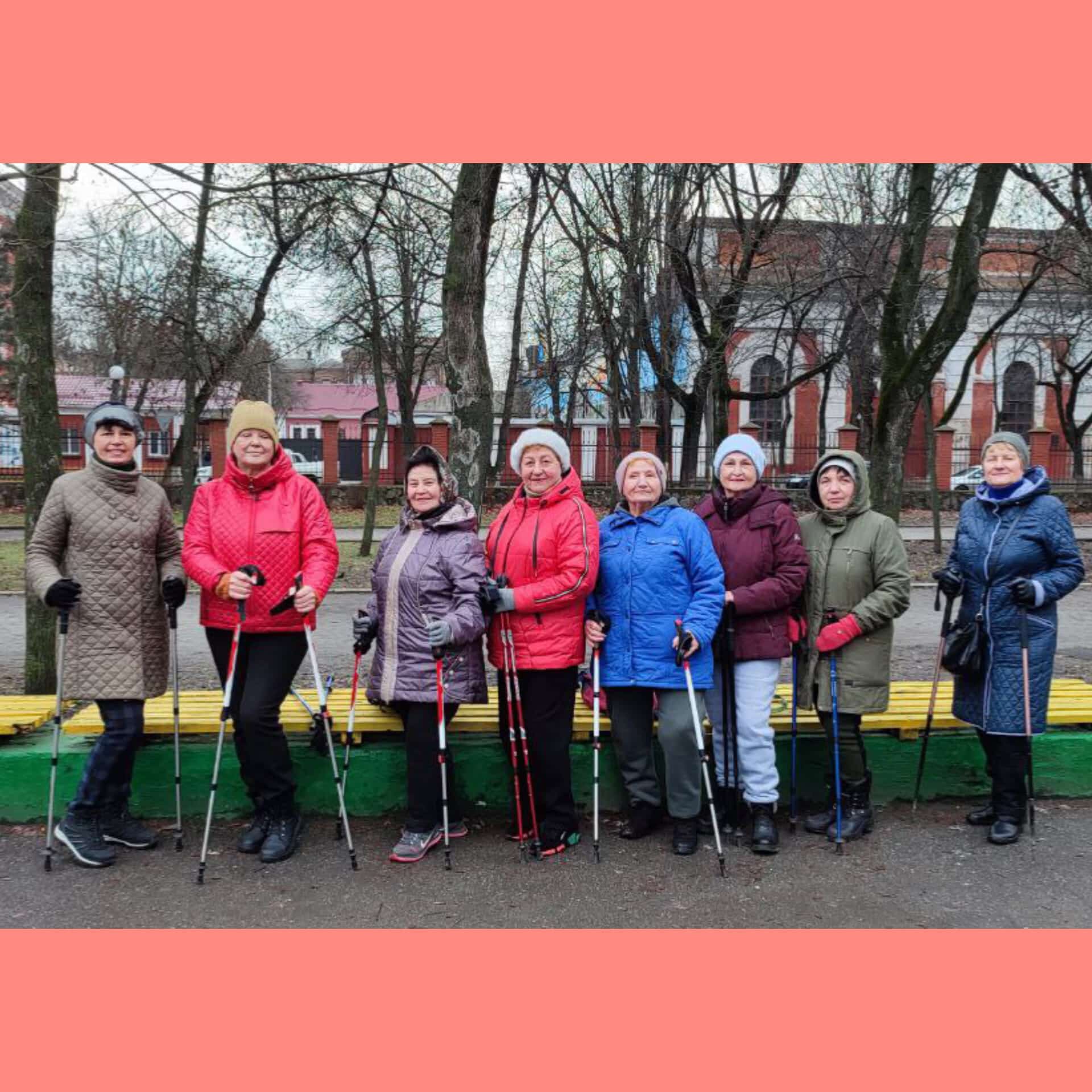As the full-scale war started, Oleksii Hladushevsky, a famous Kyiv-based screenwriter, filmmaker, and TV and movies producer had to change his life drastically. Oleksii is famous for his work on such popular TV projects as «The Biggest Loser UA», «Ukraine’s Next Top Model», a TV show «Early Swallows» and his work on the movie «My Young Prince». He left the capital due to war and moved to Chernivtsi. Here, in collaboration with a team of like-minded people who work in the movies and theatre industry, he founded the Artistic Headquarters at Mykolaychuk Cultural Centre in Chernivtsi.
During the seven months of the Artistic Headquarters’ existence, they’ve already organized movie screenings, theatre, online plays etc. Oleksii also cooperated with the movie and theatre students who also found themselves in Chernivtsi. In June, the artist and his team organized «Mykolaychuk OPEN», an offline film festival featuring viewers’ films.
We spoke with Oleksii Hladushevsky about the work of the Artistic Headquarters, volunteer unique courses and involving youth in creating a new cultural product, and also about the modern Ukrainian cinema and how it develops during the war.
How a Producer of TV And Movie Projects Became a Volunteer
Before 24 February, Oleksii Hladushevsky and his family resided in Boyarka near Kyiv. At the beginning of the war, his family didn’t plan on changing their residence, but later they learned that Russian paratroopers could have been deployed there as well, and only the brave Ukrainian soldiers stopped it. Otherwise, his town could have suffered the same horrors as Bucha, Irpin, and other Ukrainian towns near Kyiv.
«We had an opportunity to go to Odesa,» says a producer. «I am from Odesa. But we abandoned this idea as there could have been quite unsafe in that city. That’s why we chose Chernivtsi.»
His friends stopped in the small village of Mygove which is about an hour’s drive from Chernivtsi which is the capital of the Bukovyna region. As there was no accommodation a where else, they decided to stay in Mygove. In the beginning, they lived in a little summer house near the lake where it was pretty cold, but later they moved into a small hotel.
«That was when we started volunteering,» says Oleksii. «We started helping people who were looking for accommodation in Western Ukrainian regions. We would be visiting different homes, inquiring whether they had a vacancy, then we would book these accommodation options and start looking for people who needed shelter.»

In addition to that, Oleksii also would participate in filming various patriotic videos and some other creative work. Oleksii reminisces about these times.
«We were like in trance during the first month,» says Oleksii. «I couldn’t even think about creativity and creative work, as we all were working for one idea — to be useful for your country. But soon I realized that something was wrong. I wasn’t so useful doing what I was doing, as I knew I was much better at something else.»
Oleksii finally saw what his mission was. He knew he needed to unite people who are close to him and who don’t understand whether someone actually needs their creative work at the moment.
To bring his ideas to life, Oleksii moved from Mygove to Chernivtsi. The first thing they needed was a space where they would be able to host various events. Oleksii’s friends suggested trying Ivan Mykolaychuk Cultural Centre in Chernivtsi which recently opened in the city.
After I had a conversation with the director of the center, Ivan Butniak (now he is a former center director), we understood that we were almost like soulmates,” says Oleksii. «That was how we started working on establishing our Artistic Headquarters.»
«The older generation of Ukrainians often doesn’t know much about contemporary Ukrainian cinema, while the younger generation often has problems with the history of cinematography.»
The first direction of the work of the Artistic Headquarters was to familiarize a wider audience with Ukrainian cinematography. Oleksii stresses that he noticed that the older generation of Ukrainians lacked knowledge about contemporary Ukrainian cinema. He also emphasizes that internally displaced youth who found themselves in Chernivtsi is not familiar with the history of Ukrainian cinematography.
Thus, the Artistic Headquarters started working with two main directions: contemporary Ukrainian cinema which wasn’t that popular in Chernivtsi before, and not many cinemas were actually showing it, and the second lane is to make the youth familiar with the classic Ukrainian cinematography.
We decided to start this work with Ivan Mykolaychuk’s movies «The Dream» and «The Lost Letter», and others.
«We’ve noticed that Ukrainians became so interested in cinematography. Their interest increased significantly. When we demonstrated classic Ukrainian movies the cinemas were full, with 70-80% of the audience being youth,» says Oleksii.
Later we started showing other movies as well. Oleksii would arrange with the producers to show documentaries and short movies.

«We would make these shows one and a half to two hours long,» says Oleksii. «I would tell the audience about the filmmakers and movie directors, and some of them would be even present during some of the events. That was when the big shift happened. People would simply approach me and tell me that they’ve never even thought that Ukraine had such incredible cinematography.»
In the meantime, the Artistic Headquarters started developing its educational program as it saw a demand for this from the youth. In the beginning, there have been discussions about contemporary Ukrainian movies, their past, and their future, and later we launched a new section called «A Screenplay Room».
«Future screenwriters would gather here, and we would work with them on creating the right presentations and pitch their ideas during the international events for the foreign and Ukrainian foundations. I share my experience of working with the Ukrainian Filmmakers Union, the Ukrainian Film State Agency, and a few European charity foundations. Yevhen Tunik, a screenwriter and film producer who created «The First Swallows» TV show, also worked as a part of Okeksii’s team. Within the framework of the Artistic Headquarters, he also created an educational program for youth.»
The screenplays that made it through pitching sessions in both adult and youth programs are being supported, and the team is looking for opportunities to bring these screenplays on screen or stage.

Theatre is another field of activities of the Artistic Headquarters. Okeksii’s project successfully cooperated with Kyiv Drama and Comedy Theatre on the Left Bank and with the «Golden Gates» Theatre sent video recordings of a few of their plays so that they could be demonstrated by the Artistic Headquarters. Among them, there is a play «STALKER» with Irma Vitovska and Vitalina Bibliv. The actresses represented this play in person. And only about ten minutes before the play’s end, the air raid alarm went off, so Irma and Vitalina had to finish their performance in a bomb shelter.
As a part of the Artistic Headquarters program, a few theatre plays were performed in person. For example, one of them was prepared by the students of one of Kyiv’s high colleges who visited Chernivtsi together with their teacher. Okeksii’s and his colleagues made documentary movies about it.
«Mykolaychuk OPEN»: An Offline Festival of Viewers’ Movies
A few months of work in the Artistic Headquarters made Oleksiy and his two colleagues from the main team made them understand that viewers really wanted to see new Ukrainian movies that haven’t been demonstrated before.
«I saw it myself that the movies being produced in Ukraine now are so much stronger and impressive than everything we were used to before,» says Oleksii. «If a full-scale invasion wouldn’t happen there would have been a crazy year for Ukrainian cinematography, and that would have been a real breakthrough.»
However, the only way to bring these projects to life would be to do it within the framework of a festival. So Oleksii and his friend Ivan Butnyak created this festival. In the beginning, «Mykolaychuk OPEN» was a small festival, but later its producer started working with the project’s future art director Aleks Malyshenko. It was his idea to add documentary movies to the film festival’s program.
«One of the main challenges while organizing a festival is funding,» says Oleksii. «Even people who understood the importance of this event couldn’t always give us funds due to war. That’s why we did everything for free using only charity and donations for the Armed Forces of Ukraine.»

Thanks to their partners’ help they managed to arrange the tickets, accommodation, food, and the festival organizers could also bring the movie crews to Chernivtsi. Another challenge was to actually obtain the movies for the festival, as our event wasn’t known yet.
The producer tells us that he was advised to get last year’s movies for the festival but the producer insisted that it should have been only new movies, those that nobody has seen yet. So producers of the movie «The House «The Word». A Never Ending Story» Pylyp Illenko and Oleh Shcherbyna agreed to premiere their movie in Chernivtsi and to be an opener for the film festival.
When the festival organizers announced it in the media they started receiving offers from many other producers, and soon they realized they had so many movies to show that there was not enough time during the three days of the festival to fit them all in.
«So instead of three days we had almost a week-long film festival with shows,» says Oleksii. «We were lucky that there were no air raid alarms during our event. Our guests had an opportunity to watch all the movies we brought to the festival and to have a conversation with the filmmakers and actors. Earlier creatives would be thinking about how to get their movies to Europe, and now suddenly our festival became so popular that it’s actually easier now to submit your movie to the European festivals than to the Ukrainian ones.»
That’s why the festival quickly became iconic and others started organizing similar events. Students and internally displaced youth volunteered during the «Mykolaychuk OPEN» festival. These students were welcomed and hosted by the Artistic Headquarters and were allowed to prepare their graduation stage play about the war. They write the monologues themselves and together with the project curator they worked on bringing their project to life.
This play is being shown in Kyiv now, and soon young actors will go on a tour in Germany. In addition to that, their project will become a part of a documentary.
«There Will Be A Lot of Movies About War in Ukraine»
Oleksii currently works mostly on his projects. Along with a documentary that they made in Chernivtsi, there are also a few projects on a stage of a screenplay. The producer also continues working on the projects he started before the full-scale invasion.
«There is a lot of support for Ukrainian artists at the moment,» he says. «That’s why we try to apply for all the programs focused on documentary films. For example, my business partner and I just came back from Kosovo where we pitched a project in partnership with Odesa Film Festival.»
One of the latest projects Oleksii currently works on is a documentary show «Ukraine. Renaissance». It’s a web series consisting of 155 episodes and tells the history of our country after the Russian invasion covering the events, the fights, and the lives of the people of Ukraine. Mykyta Torzewsky is an author of the idea and a producer of this project.
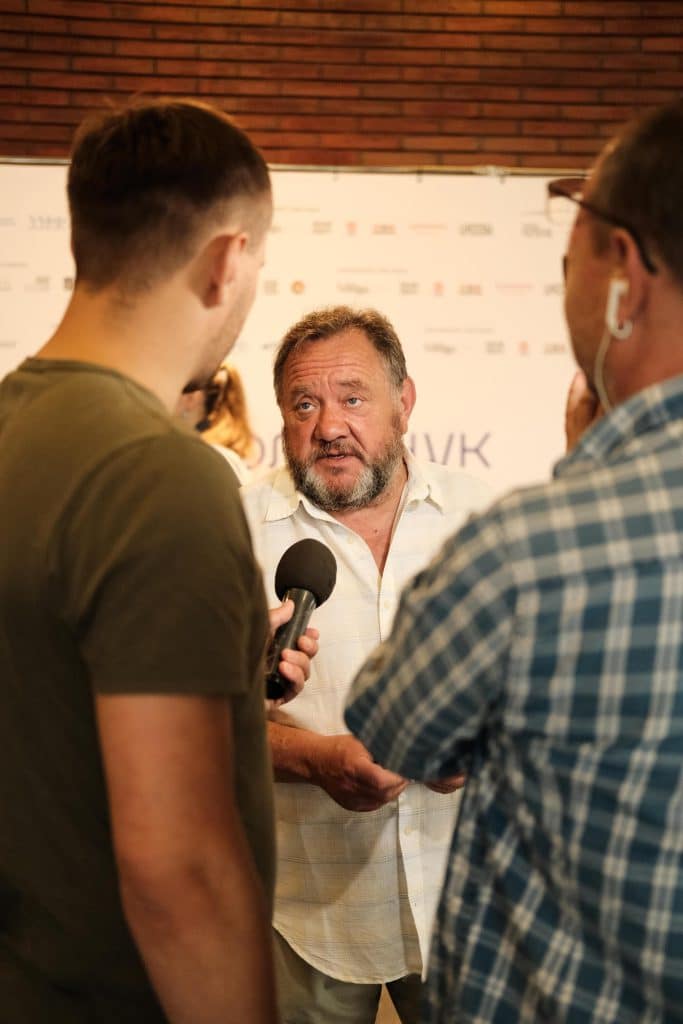
«When he offered me to join this project,» says Oleksii, «I was happy to agree. An episode I will be producing deals with the LGBTQ+ community and how they feel during the war. Modern society is divided into two categories. On one hand, our society became more tolerant and open. According to the numerous research data though, before the full-scale invasion, many people in Ukraine didn’t really support the LGBTQ+ community, and only later, when they would learn that many of these people joined the military and are fighting now, they changed their opinion. However, our episode will focus on some rather negative issues as things aren’t that good in this field. There are many stories of the people who experienced negative attitudes and prejudice even during the war.»
Oleksii is sure that soon there will be a lot of new movies about the war.
«My colleagues and I are preparing material for short and full feature movies and gathering people’s stories,» says Oleksii. «There are a lot of them who had to hide in the basements and had a terrible experience. But there are also a lot of heroes who were affected by the war on the inside.»
Now the producer and his colleagues work in the Artistic Headquarters and volunteer a lot, for instance, organizing acting courses, and all the funds they raise with this activity are donated to the Armed Forces of Ukraine. Together with the new director of the cultural and arts Center of Ivan Mykolaychuk Tetiana Dyachenko, Oleksii carried out an exhibition from the festival of contemporary animation and media arts LINOLEUM. In November and December, the Center prepares a special show program dedicated to the history of the Odesa Film Festival.


